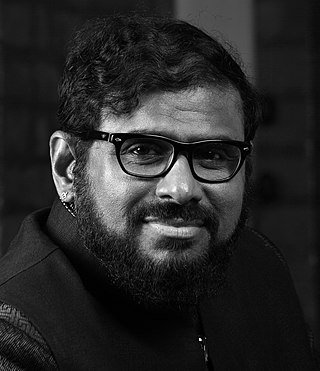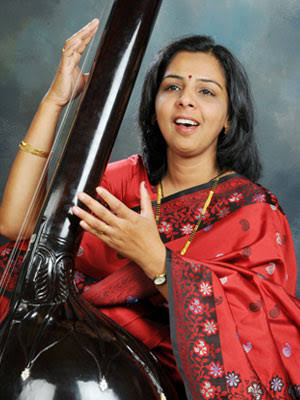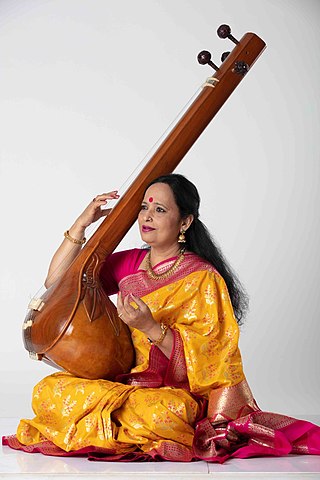| Chaturprahar | |
|---|---|
| Location(s) | NCPA, Mumbai, India |
| Years active | 2011 – Present |
Chaturprahar is an annual Indian classical music festival held at National Centre for Performing Arts (NCPA) in Mumbai, India. It is based on the concept of association of time (prahar) with the ragas. 2011 saw the inception of this festival. It usually takes place in the month of September every year. [1]
The festival started in 2011 at NCPA, Mumbai. It explores various ragas associated with different times of the day. Singing these ragas at their particular times brings out the most in them. For instance, ragas like Lalat or Bhatiyar or Bibhas are early morning ragas whereas the ones which emerge from Kalyan are best when heard in the evening.
Since 2011, the following artists have embraces the stage with their performances at Chaturprahar:
2011: Kaushiki Chakrabarty performed in the morning session Smt Devaki Pandit performed in the afternoon session. She brought out the best in her while rendering ragas like Shuddha Sarang (Bade Ghulam Ali Khan Saab's bandish Tapan Lage re) and Madhmad and Badhans Sarang. Pandit Ulhas Kashalkar performed in both the morning and late afternoon/evening sessions. In the evening session, he rendered, in his soulful voice, Raga Dhanasree, Raga Multani
2012: This year saw performances from stalwarts like Gundecha brothers, Ashwini Bhide Deshpande and Jayteerth Mevundi
Pandit Pran Nath was an Indian classical singer and master of the Kirana gharana singing style. Promoting traditional raga principles, Nath exerted an influence on notable American minimalist and jazz musicians, including La Monte Young, Terry Riley, and Don Cherry. He began performing in the United States in the 1970s, and established the Kirana Center for Indian Classical Music in 1972; he subsequently taught in various universities across the US and Europe.

Hariprasad Chaurasia is an Indian music director and classical flautist, who plays the bansuri, in the Hindustani classical tradition.

Pandit Bhimsen Gururaj Joshi, also known by the honorific prefix Pandit, was one of the greatest Indian vocalists from Karnataka, in the Hindustani classical tradition. He is known for the khayal form of singing, as well as for his popular renditions of devotional music. Joshi belongs to the Kirana gharana tradition of Hindustani Classical Music. He is noted for his concerts, and between 1964 and 1982 Joshi toured Afghanistan, Italy, France, Canada and USA. He was the first musician from India whose concerts were advertised through posters in New York City. Joshi was instrumental in organising the Sawai Gandharva Music Festival annually, as homage to his guru, Sawai Gandharva.
Hindustani classical music is the classical music of the Indian subcontinent's northern regions. It may also be called North Indian classical music or, in Hindustani, shastriya sangeet. The term shastriya sangeet literally means classical music, and is also used to refer to Indian classical music in general. It is played on instruments like the veena, sitar and sarod. Its origins from the 12th century CE, when it diverged from Carnatic music, the classical tradition in South India. While Carnatic music largely uses compositions written in Sanskrit, Kannada, Telugu, Tamil, Malayalam, Hindustani music largely uses compositions written in Hindi-Urdu, Braj, Avadhi, Punjabi, and Rajasthani,.

Pandit Jasraj was an Indian classical vocalist, belonging to the Mewati gharana. His musical career spanned 75 years resulting in national and international fame, respect and numerous major awards and accolades. His legacy includes memorable performances of classical and semi-classical vocal music, classical and devotional music, albums and film soundtracks, innovations in various genres including Haveli Sangeeth and popularizing the Mewati Gharana – a school of thought in Hindustani classical music. Pandit Jasraj taught music to amateur and professional students in India, Europe, Canada and the United States.

The Sawai Gandharva Bhimsen Mahotsav is an annual Indian Classical music festival held in Pune since 1953. The festival is hosted by the Arya Sangeet Prasarak Mandal (ASPM) and initiated by Bhimsen Joshi as a memorial music conference commemorating the life and work of Joshi's guru, Sawai Gandharva, the festival's namesake.

Rahul Deshpande is an Indian classical music singer and actor. He is the recipient of a National Film Award for his work in Me Vasantrao. He is the grandson of Vasantrao Deshpande.

The Gundecha Brothers are Indian classical singers of the dhrupad genre of the Dagar vani. From 1985 to 2019 the duo consisted of brothers Umakant Gundecha and Ramakant Gundecha and were awarded the Padma Shri for art for 2012. Following the death of Ramakant Gundecha in 2019, his son Anant began to perform with Umakant in the Gundecha bandhu.

Milind Date is an Indian flautist and music composer who plays the bansuri. He studied under Hariprasad Chaurasia and is known for his technique and playing in various musical styles.

Ramesh Narayan is an Indian classical vocalist, composer and music producer who works predominantly in Malayalam cinema. He belongs to the Mewati gharana of Hindustani classical music. Narayan began his initial training in Carnatic music and later mastered the classical Hindustani style under the renowned Pandit Jasraj.
Vasanta Habba, which means spring festival in the Kannada language, is a cultural festival organised by the Nrityagram foundation in the city of Bangalore, India. It is a very popular event and is considered the classical Woodstock of India. This festival, first held in the year 1990, was the brainchild of Protima Bedi, the founder of Nrityagram. The festival is held in the premises of Nrityagram at Hesaraghatta in the outskirts of Bangalore and attracts the best musicians, dancers and cultural artists from across India. Starting from an audience of about 3000 in its inaugural year, the 2003 edition saw over 40,000 people attending the event.

Ram Narayan, often referred to with the title Pandit, is an Indian musician who popularised the bowed instrument sarangi as a solo concert instrument in Hindustani classical music and became the first internationally successful sarangi player.

Kaushiki Chakraborty is an Indian classical vocalist of the Patiala gharana. Her repertoire covers pure classical, Khyals, Dadras, Thumris, Bhajans and several other forms of Indian music. She is the recipient 2005 BBC Radio 3 Awards for World Music in the Asia-Pacific category. She is the daughter of noted hindustani classical vocalist, Ajoy Chakraborty. Kaushiki is also a trained Carnatic classical vocalist.
Gandharva Mahavidyalaya New Delhi is an institution established in 1939 to popularize Indian classical music and dance. The Mahavidyalaya (school) came into being to perpetuate the memory of Pandit Vishnu Digambar Paluskar, the great reviver of Hindustani classical music, and to keep up the ideals set down by him. The first Gandharva Mahavidyalaya was established by him on 5 May 1901 at Lahore. The New Delhi school follows the syllabi set by the Akhil Bharatiya Gandharva Mahavidyalaya Mandal.
Padma Talwalkar is an Indian classical vocalist.
Arvind Parikh is an Indian classical sitar player.

Ustad Ghulam Mustafa Khan was an Indian classical musician in the Hindustani classical music tradition, belonging to the Rampur-Sahaswan Gharana.

Manjusha Kulkarni-Patil is a Hindustani classical music vocalist. She belongs to the Gwalior gharana.
Madhukar Dhumal is an Indian Shehnai Player, Composer and freelance Musician. He is a disciple of Guni Gandharva Pandit Laxmanprasad Jaipurwale and Pandit Rajaram Sukhla.He is part of many other bands and has performed with various artists around the world. Majorly performed for Bollywood industry with all known Music directors.

Sunanda Sharma is an Indian classical singer. She performs across multiple genres and styles – khyal, thumri, dadra, chaitis, and kajris.